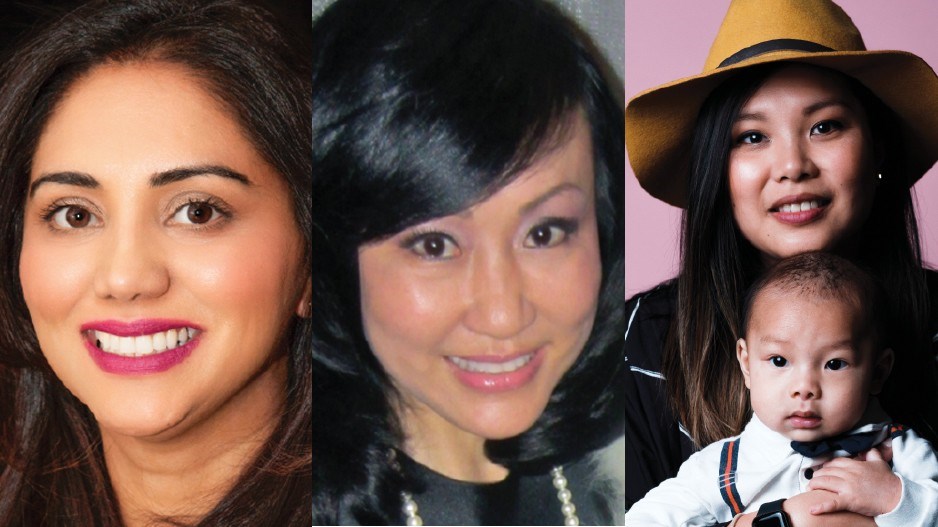A number of challenges slow or stop the rise of women of colour to the upper rungs of the corporate ladder, including double standards and unconscious biases.
BIV’s Women in Business spoke to three female leaders who were willing to share their journeys and rules for success.
Tammy Tsang, co-founder, AndHumanity
As protesters across North America call out police violence and systemic racism, conversations about inclusion, diversity and equity have gained greater momentum online and in the workplace.
Richmond-based entrepreneur Tammy Tsang, co-founder of AndHumanity – a marketing firm that aims to reflect and promote people from different cultural backgrounds, – has been having similar conversations her whole life.
“To me, [the Black Lives Matter movement] opened the box of conversations that have been brewing underneath for so long.… I have been having these conversations my whole life: how am I going to break the glass ceiling as an Asian female?” said Tsang.
Tsang didn’t fully realize the complexity of challenges around diversity and inclusion until she had her son. During that time, the second-generation Cantonese mom struggled to find an Asian male role model for her child.
Tsang considered herself “lucky” she was raised by her mother, a successful entrepreneur that she could look up to while growing up. Unfortunately, finding a strong Asian male role model for her son was tough.
In the hope of helping all children see themselves represented in positions of power and feel proud of who they are, Tsang built AndHumanity’s vision around “creating a society where everyone belongs.”
“It sounds so silly, but it’s true. Even in Canada, one of the most multicultural, diverse places in the world, people still don’t feel like they belong here. … People of colour are always worried about how they are going to be perceived when they walk into a room,” she said. “They will be judged on how they look or how they act. It doesn’t bring out the best of ourselves when you are constantly being judged.”
According to Tsang, the only way to educate people to understand the benefits of diversity is through education, which requires a united effort from the whole community.
Tsang is positive about change occurring – even though many more changes are needed.
“Let’s just cut some slack. Do the education, be kind to one another and learn each other’s culture in an open-minded way. Essentially what it is isn’t about being better or worse, just different,” said Tsang.
Pria Sandhu, chief executive officer, BC Doctors of Optometry
Pria Sandhu, CEO of BC Doctors of Optometry, is leading an organization with a diverse board of directors that exemplifies the fabric and makeup of the province it serves.
Sandhu and her team have invested in implementing cultural sensitivity training at their annual conference to ensure all optometrists are educated and are ready to serve B.C.’s diverse population.
A lot has changed.
More than 12 years ago, when Sandhu assumed the role of executive director of Resident Doctors of BC, she remembers being mistaken for a board secretary when she first walked into a boardroom of a healthcare organization.
“I have overcome those challenges where people think like: ‘Is she the leader or can we talk to the person who is actually in charge.’ I have learned that I have had to earn trust, build respect and credibility … and prove yourself as a female leader that you are knowledgeable and have the skillset and the experience to lead, guide and be inspirational.”
Sandhu added that she believes that “out of adversity comes opportunity.”
Unlike industries that remain white and male-dominated, more women are willing to serve in the health-care sector, said Sandhu, who added that she’s proud to see the industry’s increased diversity and encourages other well-established female leaders to give back by paying it forward.
“We always need to have the gratitude for giving back and developing others,” said Sandhu.
Cecilia Tse, senior vice-president, Asia Pacific, Colliers International
While a lack of representation in a workplace can make a woman of colour feel uncomfortable or alone, some leaders think being different is an advantage.
If people can stop attaching negative labels to themselves, big transformations will start happening in every area of their life, said to Cecilia Tse, senior vice-president of Asia Pacific at Colliers International, a Canada-based global commercial real estate services organization.
Born in Hong Kong and educated in Canada, Tse joined Colliers International in 2006, bringing more than 13 years of real estate experience with her from Hong Kong.
“Some people asked me before, ‘Did you really never face any obstacles?’ I don’t have any obstacles – not even being a female. I never see any impenetrable barriers. All I see are challenges that I need to embrace and help me be stronger than before,” said Tse. “You should never think in a negative way and let restrictions take choices away from you.”
Tse recalls when she was allowed to lead a commercial marketing project for Richmond’s Aberdeen Square shopping mall. Many local-born real estate marketing experts hesitated to take on what was then a challenging project, but Tse saw its potential – that the shopping mall was close to a SkyTrain station.
“No one realized at that time that transit-oriented could be a selling point. Because of the knowledge I had in Asia, I knew the project would be very successful,” said Tse.
The truth speaks for itself: now nearly every Richmondite knows Aberdeen Square.
“Nowadays, we need a global vision to be successful. Being exposed to different cultures can make us think differently, which could allow us to utilize our skills and talents fully,” said Tse, adding that the foundation for success is hard work, a focus on gaining knowledge and not being scared of change.
“If you have all of these virtues, then nothing is an obstacle unless you say it is.”




